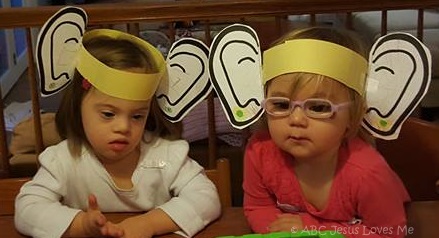
Teaching the Bible to young children provides the opportunity for them to learn who God is and what He does. Through interactive stories, hands-on activities, and fun songs, you can make God’s love and truth come alive. These ideas will help you create an engaging and meaningful Bible time that captures their hearts.
On this page discover six practical steps to make Bible time engaging, meaningful, and a part of children's everyday lives.
I believe it is incredibly important for every child to have their own Bible. While Bible stories are easily accessible online, there's something special about a child holding their own Bible—taking it to church, placing it on their nightstand, and feeling connected to God's Word.
It's crucial to choose a Bible that is age-appropriate, biblically accurate, includes Scripture references, and has engaging illustrations that capture a child's attention. Just like a favorite storybook, a Bible should be read again and again, not shelved after just one reading.
Below are the children's Bibles most used in our home and the ones included in the ABCJesusLovesMe Preschool Curriculum. Click to view all my favorites and tips for choosing a quality Bible for your home or classroom.
Specifically for toddlers, this children's Bible is simple enough to understand yet engaging to give the child a solid understanding of the Bible stories.
This is the suggested Bible for the Complete 1 Year and 2 Year Preschool Curricula as well as the Basic 1 and 2 Year Curricula for family use.
The Beginner's Bible is my absolute favorite for preschoolers! Its beautifully illustrated pages complement the simply written stories, making them engaging and easy to understand. Unlike many other children’s Bibles, this one presents the Bible stories authentically, without adding extra, unbiblical details. The Deluxe Edition contains the Bible and two narration CD's of all 94 Bible stories. Read my review ...
This Bible is suggested in the Basic and Complete 3 and 4 Year Curricula.
I absolutely love this Bible! It uses Scripture from the New Living Translation rather than retelling stories, and includes activities, songs, questions, prayers, and a "Jesus Connection" to help children engage with the text on a deeper level. Read my review ...
This Bible is used in the Basic Curriculum as well as the 4 and 5 Year Complete Curricula.
Are you ready to embark on an incredible journey of faith and discovery with your child or students? Look no further! Our Old and New Testament Curriculum Bundle is the perfect companion for home, preschool, or church Sunday School or mid-week meeting Bible learning. It's time to immerse your little ones in the enriching world of biblical stories and truth.
Routines help prepare children's minds and bodies for what’s coming next. Begin Bible time with the same poem or song each day to signal that it’s time to listen and sit quietly. You can choose from one of the following options.
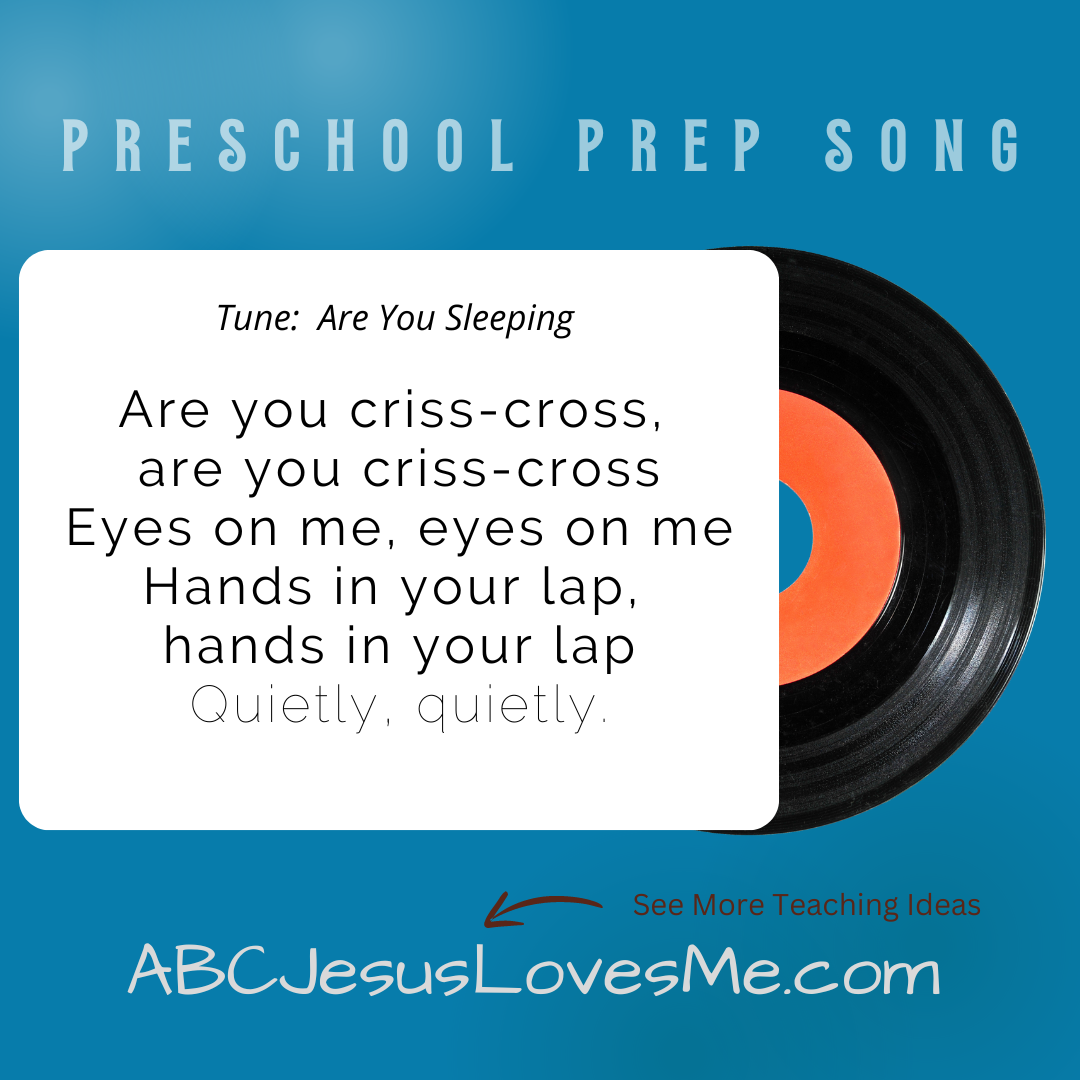
Tune: Are You Sleeping?
Are you criss-cross, are you criss-cross
Eyes on me, eyes on me
Hands in your lap, hands in your lap
Quietly, quietly (whisper)
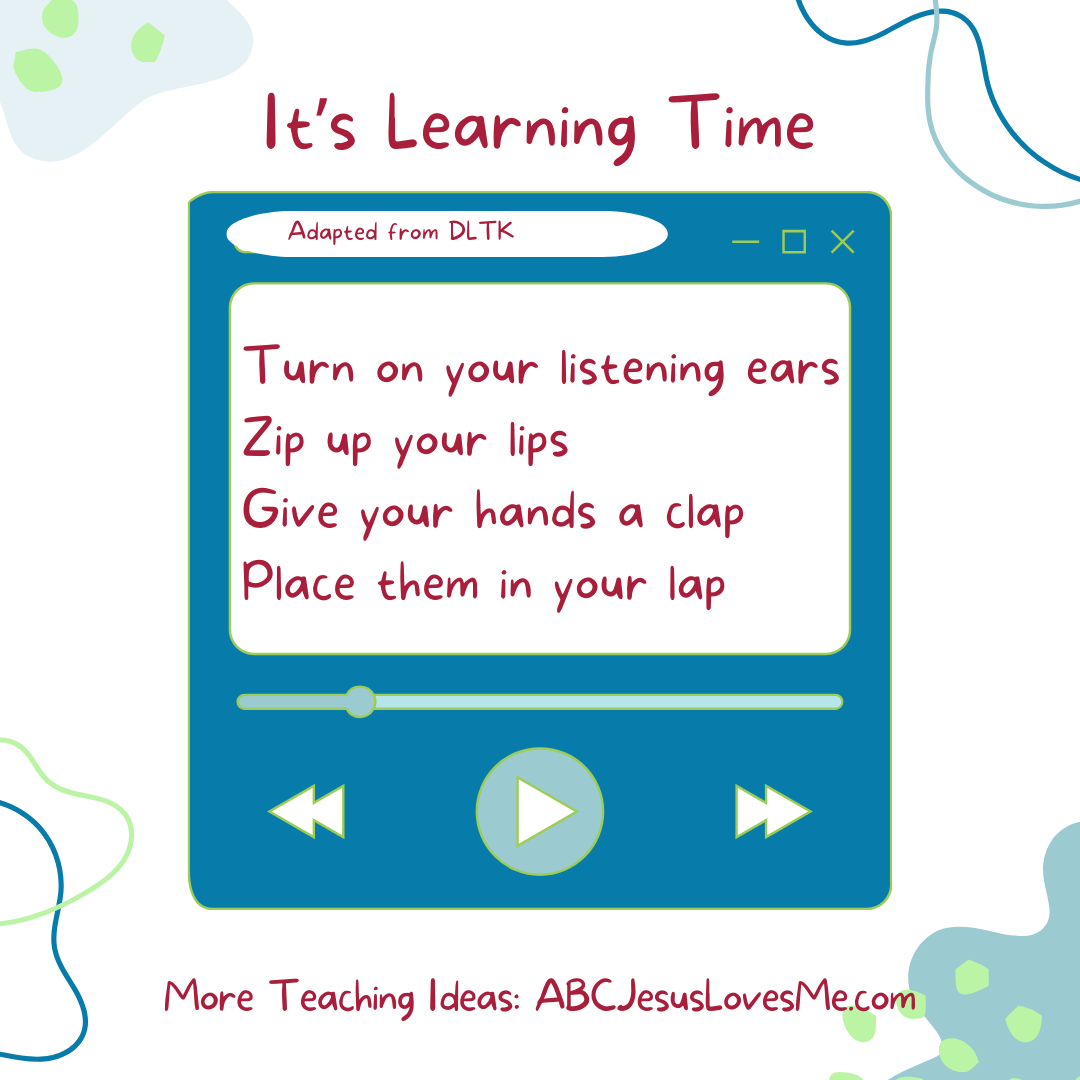
Turn on your listening ears
Zip up your lips
Give your hands a clap
Place them in your lap
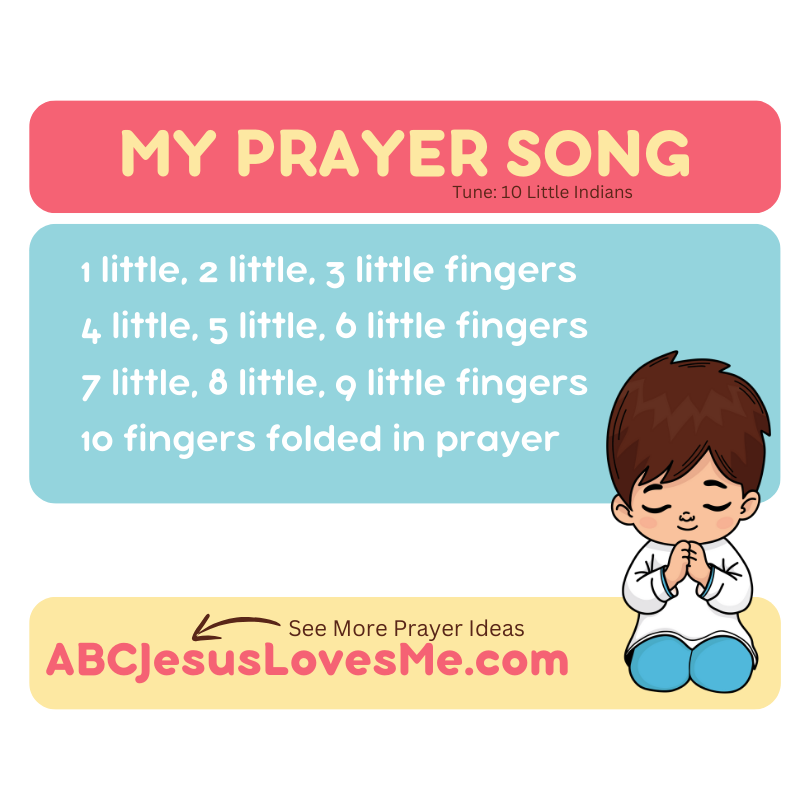
Tune: One Little, Two Little, Three Little Indians
One little, two little, three little fingers
Four little, five little, six little fingers
Seven little, eight little, nine little fingers
Ten fingers folded in prayer
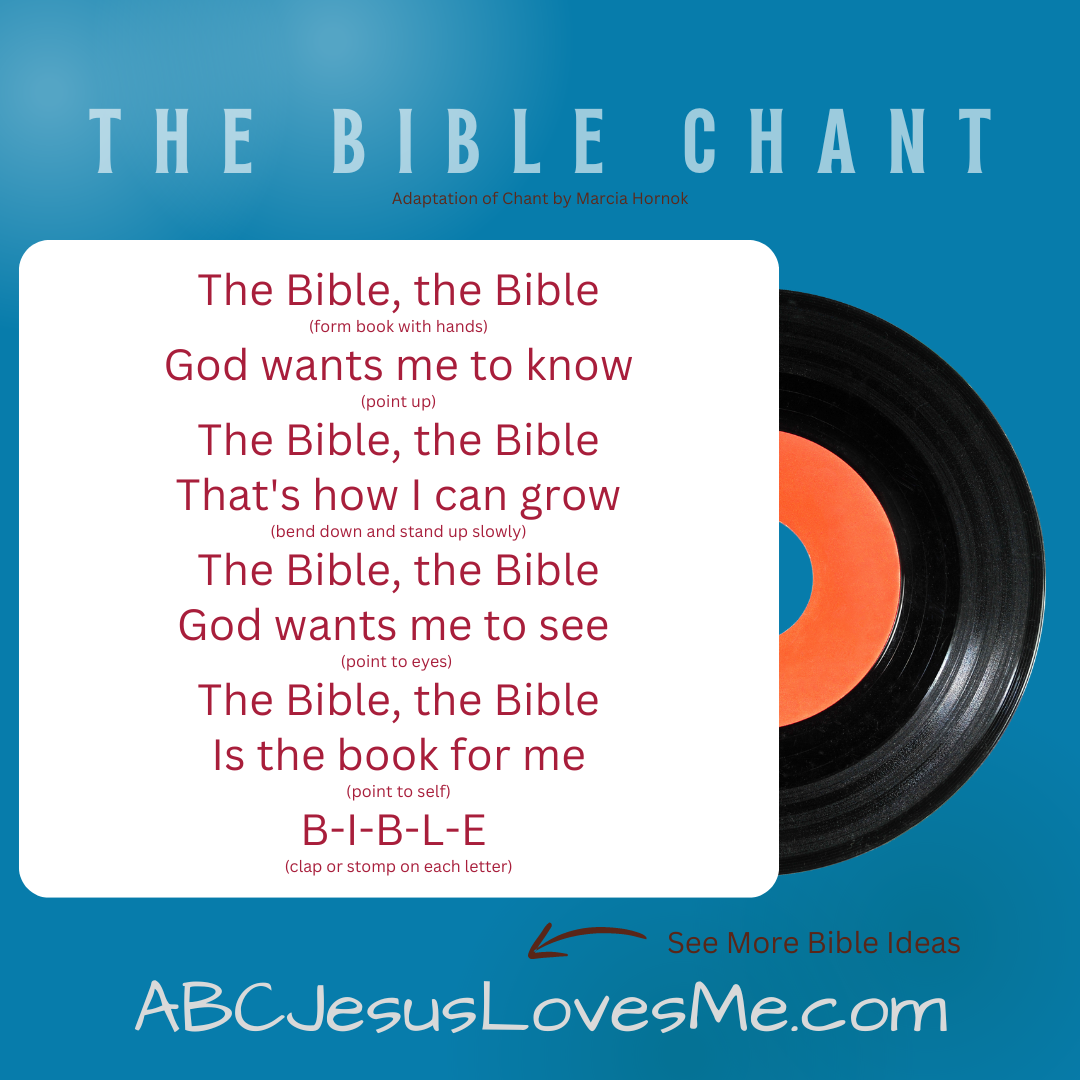
The Bible, the Bible (form book with hands)
God wants me to know (point up)
The Bible, the Bible
That's how I can grow (bend down and stand up slowly)
The Bible, the Bible
God wants me to see (point to eyes)
The Bible, the Bible
Is the book for me (point to self)
B-I-B-L-E (clap or stomp on each letter)
In the ABCJesusLovesMe Curricula, the same Bible lesson is taught for a full week. This gives the child plenty of time to learn character names, the basic story plot, and the memory verse.
To enhance visual and tactile learning, I recommend using props or flannelgraph to make the story interactive. For older children, incorporating a Bible timeline can help them understand the chronological order of Bible stories. Each day, provide the child with more opportunities to engage and participate in the story.
Day 1: The teacher or parent tells the story using the props.
Day 2: The child helps with the props as the teacher or parent tells the story.
Day 3: The teacher or parent retells the story, allowing the child to add key points.
Day 4: The teacher or parent guides the child in telling the story by leading them through the main points.
Day 5: The child has the opportunity to tell the basic plot of the Bible story on their own.
When practicing the weekly Bible verse, don't dismiss the scripture reference. Help the child remember the reference by displaying the numbers on their fingers. This is excellent fine motor practice as well (ie. Genesis 1:1 - point "one" with one hand and then "one" with the other hand). Another option is to point to numbers on a piece of paper or made with magnet numbers on the refrigerator.
In this Live Broadcast, I’ll share helpful tips on how to effectively tell Bible stories to young children, making the stories come alive in an engaging and age-appropriate way. Then, I’ll walk you through an example story of Abraham and Sarah Have a Baby, showing how to captivate your child’s attention while teaching them valuable lessons from the Bible.
Flannelgraph is one of the best tools for bringing Bible stories to life for young children. In this video, I’ll share why I love using flannelgraph and give you practical tips for making it an engaging and effective teaching tool.
Reading with your child is a valuable opportunity to teach and connect. In this video, you’ll learn simple strategies to engage your child and make the most of every story. Discover ways to ask questions, spark curiosity, and encourage participation, turning reading time into a fun and educational experience!
For effective Bible study, it's important for a person to be familiar with the order of the 66 books. With simple teaching tips and fun songs, even preschool children can grasp this knowledge for a better understanding of God's story shared in the Bible.
Cover your children, grandchildren, or students in prayer with this 31-day calendar of powerful Bible verses. Each day focuses on themes like wisdom, courage, love, and godly character, praying for spiritual guidance and strength for the next generation.
Children learn best when all three learning styles—auditory, visual, and tactile—are engaged. Using simple props can enhance their understanding and retention.
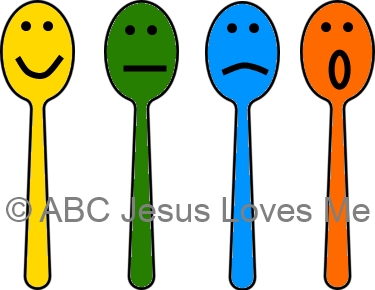
Drawing faces on plastic spoons or jumbo popsicle sticks can be a fun way to tell a Bible story. You can add yarn for hair and scraps of fabric for clothes to create characters for any story. Encourage the child to play with the puppets and share their own childlike version of the story.
Cut various colored ribbon 2-3' long. Melt the ends to keep them from fraying. Tie each ribbon to a stick for the child to hold. I drilled small holes into the end of popsicle sticks and threaded a ribbon through each.
Here are some ways to use the ribbons in Bible stories.
- Noah's Ark - Have the child wave ribbons representing the various colors of the rainbow.
- Jesus Calms the Storm - Wave blue ribbons to create a storm, immediately pulling the ribbons to the ground when Jesus says, "Be still."
- Palm Sunday - Raise green ribbons as palms.
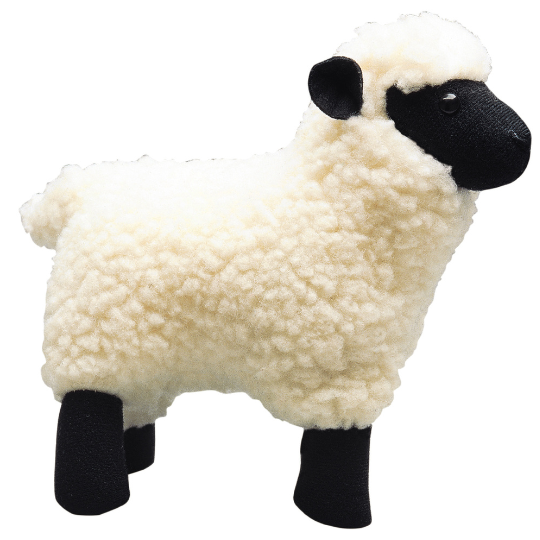
Using stuffed animals or puppets can make Bible stories come alive for children. Assign different characters to each puppet or animal and use them to act out the story, encouraging the child to join in and interact. Here are some examples:
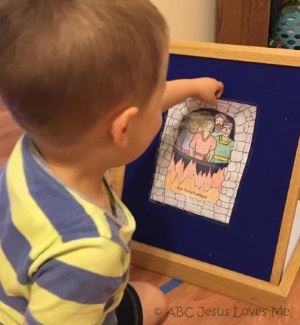
I believe that the use of flannelgraph figures and objects is one of the best ways to teach children Bible stories. Betty Lukens sets are specifically references in each Lesson Plan.
Our Memory Verse Packets are designed to make Scripture memory fun and easy to learn. Each packet includes key Bible verses set to songs with simple actions to help kids memorize God’s Word. A fun, hands-on way to build a strong foundation of faith!
Deuteronomy 6:4-9 commands us "impress" God's commandments on children "when you sit at home, walk along the road, lie down, and get up. Tie them as symbols on your hands and bind them on your foreheads. Write them on the doorframes of your houses and on your gates." These verses are the foundation of the ABCJesusLovesMe and ParentingtoImpress ministry. After telling the Bible story to a child, further the learning in these simple ways.
Refer to Bible lessons during everyday situations to remind the child that God is in control. For example, if it’s raining, you can talk about Noah and the ark, or if the child feels afraid, you can share the story of Daniel in the lion’s den. This helps connect the Bible to their daily life.
Below are three avenues to impress God upon our children during a teachable moment:
Encourage the child to pretend to be Bible character. Provide dress up clothes. Early episodes of Adventures in Odyssey by Focus on the Family depicting this fun, imaginary play. Specifically listen to Family Vacation Part 2 to hear about David and Johnathon.
The "What's in the Bible?" DVDs are a fantastic resource for explaining what the Bible is and what each book contains. Created by Phil Vischer, the founder of VeggieTales®, this series is designed to guide kids and families through the entire Bible. Geared toward elementary-aged children, the 13 DVDs cover everything from Genesis to Revelation. Our whole family has gained a deeper understanding of the Bible through this engaging program.
I have found the GotQuestions.org website to be very helpful in answering tough questions about the Bible. Each answer is Bible-based and provides references for further study. As with any resource, look at Scripture before and after references to assure proper context.